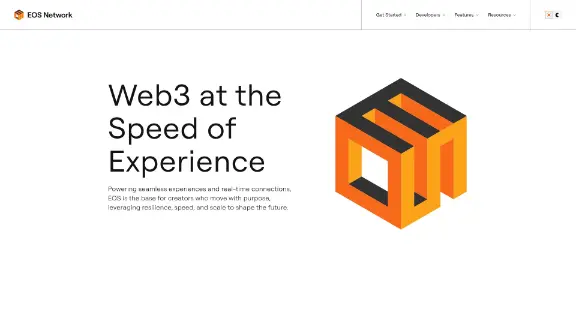EOS (EOS)
EOS is a cryptocurrency token associated with EOSIO, a blockchain platform that facilitates decentralized applications and decentralized autonomous corporations.
History of EOS
The EOSIO platform was introduced through a white paper in 2017. Developed by Block.one, a private company, it became open-source software on June 1, 2018. During its launch, one billion tokens were distributed as ERC-20 tokens by Block.one. The CEO, Brendan Blumer, announced a significant financial backing for the blockchain, resulting in over four billion USD raised during the Initial Coin Offering (ICO) period. EOSIO's first testnet, Dawn 1.0, launched in September 2017, followed by several updates before the official release of EOSIO 1.0 in June 2018. EOSIO 2.0 was launched in January 2020.

| Ticker | EOS |
| Category | Smart Contract Platform |
| Website | https://eosnetwork.com/ |
| @eosnetworkfdn | |
| Telegram | EOS_Global |
| https://www.reddit.com/r/eos |
Tokenomics of EOS
Block.one initiated the EOS token sale on June 26, 2017, selling 200 million tokens over five days, raising $172 million. Over a subsequent 350-day period, two million tokens were sold daily, culminating in $4.02 billion. The final 100 million tokens were reserved for Block.one, set to be released linearly over ten years starting June 2019.
Supply details
The EOS network features a 1% annual inflation rate, distributed between Block Producers (BPs) and Standby Producers, receiving 0.25% and 0.75% respectively. Twenty-one BPs receive more daily EOS rewards due to their limited number. Standby Producers, ranked outside the top 21, earn a minimum daily reward based on voting support.
Utility
EOS tokens are used for accessing network bandwidth, computational and storage capacity, and voting rights. The level of access is proportional to the number of tokens held or staked. Unlike Ethereum or Bitcoin, EOS transactions do not require fees, as block producers earn tokens through new block creation. Users must acquire network resources proportionally to their activity levels.
Technology of EOS
EOS was developed by Block.one and utilizes a delegated Proof-of-Stake (DPoS) consensus mechanism, Graphene technology, and parallel processing to enhance performance. Graphene, created by Dan Larimer, improves transaction processing and is used in other projects like Bitshares and Steem. Parallel computation divides transactions among multiple processors to reduce runtime. EOS employs the WebAssembly Virtual Machine (WASM) for high speed and performance, supporting various programming languages.
Governance in EOS
EOS employs on-chain governance through its DPoS system, allowing token holders to vote on protocol decisions. Votes are weighted by token holdings, and holders can delegate their votes. Decisions may include changes to system parameters, updates to the User Agreement, or inflation rate alterations.
Block.one
Block.one, registered in the Cayman Islands, is a publisher of decentralized applications and open-source software like EOSIO. It played a key role in the development of the EOS network, raising over $4 billion through an ICO. The company is led by Brendan Blumer, co-founded in 2016 with Dan Larimer.
ENF and Block.one
The EOS Network Foundation (ENF) supports the EOS ecosystem's development. In November 2021, ENF CEO Yves La Rose expressed a new direction for EOS, emphasizing the foundation's role. The EOS community engaged a Canadian law firm to explore legal options regarding Block.one's actions.
Switch to Antelope
In August 2022, the EOS Network Foundation announced the adoption of Antelope as the protocol for EOSIO-based blockchains. This decision followed a fork of the EOSIO code, leading to the Antelope project, which replaced the previous "Mandel" initiative.
Antelope
Antelope is an open framework blockchain using a Delegated Proof-of-Stake (DPoS) consensus model. It supports a wide array of applications, including decentralized finance, supply chain management, non-fungible tokens, and games. The Antelope Coalition has issued Requests for Proposals to enhance the protocol, promoting collaboration and innovation across the platform.
